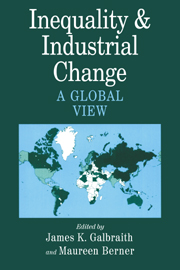Book contents
- Frontmatter
- Contents
- Contributors
- Permissions
- Acknowledgments
- PART I INTRODUCTION TO THEORY AND METHOD
- PART II INEQUALITY, UNEMPLOYMENT, AND INDUSTRIAL CHANGE
- PART III INEQUALITY AND DEVELOPMENT
- 7 Toward a New Kuznets Hypothesis: Theory and Evidence on Growth and Inequality
- 8 Measuring the Evolution of Inequality in the Global Economy
- 9 Economic Regionalization, Inequality, and Financial Crises
- 10 Inequality and State Violence: A Short Report
- 11 Grading the Performance of Latin American Regimes, 1970–1995
- 12 The Evolution of Industrial Earnings Inequality in Mexico and Brazil
- 13 The Legacy of the HCI: An Empirical Analysis of Korean Industrial Policy
- 14 Inequality and Economic Development: Concluding Reflections
- PART IV METHODS AND TECHNIQUES
- Data Appendix
- References and Selected Bibliography
- Index
13 - The Legacy of the HCI: An Empirical Analysis of Korean Industrial Policy
Published online by Cambridge University Press: 05 June 2012
- Frontmatter
- Contents
- Contributors
- Permissions
- Acknowledgments
- PART I INTRODUCTION TO THEORY AND METHOD
- PART II INEQUALITY, UNEMPLOYMENT, AND INDUSTRIAL CHANGE
- PART III INEQUALITY AND DEVELOPMENT
- 7 Toward a New Kuznets Hypothesis: Theory and Evidence on Growth and Inequality
- 8 Measuring the Evolution of Inequality in the Global Economy
- 9 Economic Regionalization, Inequality, and Financial Crises
- 10 Inequality and State Violence: A Short Report
- 11 Grading the Performance of Latin American Regimes, 1970–1995
- 12 The Evolution of Industrial Earnings Inequality in Mexico and Brazil
- 13 The Legacy of the HCI: An Empirical Analysis of Korean Industrial Policy
- 14 Inequality and Economic Development: Concluding Reflections
- PART IV METHODS AND TECHNIQUES
- Data Appendix
- References and Selected Bibliography
- Index
Summary
While much has been written on the successes and failures of industrial policies, systematic evaluation of their effects remains difficult. This chapter presents an approach based on a combination of cluster and discriminant analysis applied to time series of the rate of change of average wages by industry. We apply this approach to a Korean data set that may be one of the most comprehensive national archives of industrial and occupational wage data in the world. Our approach permits quantitative assessment of the legacy of Korean industrial policy and helps to show how Korean development has depended both on government and on the market.
Introduction
Governments and markets both exist. And while enthusiasts of markets have contested the role of government in development, and vice versa, it seems more realistic to accept that both play roles. The important questions are therefore:What roles? Through what channels? And to what extent? A sensible way to advance this discussion is to present an empirical indicator that can show the legacy of policies and other factors that have contributed to industrial and economic growth, and thereby approach the issue of the role of the government and the market. This chapter presents a combination of cluster and discriminant analysis applied to time series of average wage change by industrial category in order to assess the balance of government and market forces in Korea, with the Korean Heavy and Chemical Industrialization (HCI) as the prime example.
- Type
- Chapter
- Information
- Inequality and Industrial ChangeA Global View, pp. 238 - 255Publisher: Cambridge University PressPrint publication year: 2001
- 1
- Cited by

